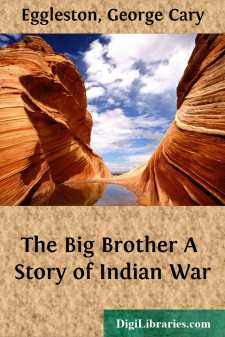Categories
- Antiques & Collectibles 13
- Architecture 36
- Art 48
- Bibles 22
- Biography & Autobiography 813
- Body, Mind & Spirit 142
- Business & Economics 28
- Children's Books 15
- Children's Fiction 12
- Computers 4
- Cooking 94
- Crafts & Hobbies 4
- Drama 346
- Education 46
- Family & Relationships 57
- Fiction 11828
- Games 19
- Gardening 17
- Health & Fitness 34
- History 1377
- House & Home 1
- Humor 147
- Juvenile Fiction 1873
- Juvenile Nonfiction 202
- Language Arts & Disciplines 88
- Law 16
- Literary Collections 686
- Literary Criticism 179
- Mathematics 13
- Medical 41
- Music 40
- Nature 179
- Non-Classifiable 1768
- Performing Arts 7
- Periodicals 1453
- Philosophy 64
- Photography 2
- Poetry 896
- Political Science 203
- Psychology 42
- Reference 154
- Religion 513
- Science 126
- Self-Help 84
- Social Science 81
- Sports & Recreation 34
- Study Aids 3
- Technology & Engineering 59
- Transportation 23
- Travel 463
- True Crime 29
The Big Brother A Story of Indian War
Categories:
Description:
Excerpt
SINQUEFIELD.
In the quiet days of peace and security in which we live it is difficult to imagine such a time of excitement as that at which our story opens, in the summer of 1813. From the beginning of that year, the Creek Indians in Alabama and Mississippi had shown a decided disposition to become hostile. In addition to the usual incentives to war which always exist where the white settlements border closely upon Indian territory, there were several special causes operating to bring about a struggle at that time. We were already at war with the British, and British agents were very active in stirring up trouble on our frontiers, knowing that nothing would so surely weaken the Americans as a general outbreak of Indian hostilities. Tecumseh, the great chief, had visited the Creeks, too, and had urged them to go on the war path, threatening them, in the event of their refusal, with the wrath of the Great Spirit. His appeals to their superstition were materially strengthened by the occurrence of an earthquake, which singularly enough, he had predicted, threatening that when he returned to his home he would stamp his foot and shake their houses down. Their own prophets, Francis and Singuista, had preached war, too, telling the Indians that their partial adoption of civilization, and their relations of friendship with the whites, were sorely displeasing to the Great Spirit, who would surely punish them if they did not immediately abandon the civilization and butcher the pale-faces. Francis predicted, also, that in the coming struggle no Indians would be killed, while the whites would be completely exterminated. All this was promised on condition that the Indians should become complete savages again, quitting all the habits of industry and thrift which they had been learning for some years past, and fighting mercilessly against all whites, sparing none.
All these things combined to bring on the war, and during the spring several raids were made by small bodies of the Indians, in which they were pretty severely punished by the whites. Finally a battle was fought at Burnt-corn, in July 1813, and this was the signal for the breaking out of the most terrible of all Indian wars,—the most terrible, because the savages engaged in it had learned from the whites how to fight, and because many of their chiefs were educated half-breeds, familiar with the country and with all the points of weakness on the part of the settlers. Stockade forts were built in various places, and in these the settlers took refuge, leaving their fields to grow as they might and their houses to be plundered and burned whenever the Indians should choose to visit them. The stockades were so built as to enclose several acres each, and strong block houses inside, furnished additional protection. Into these forts there came men, women, and children, from all parts of the country, each bringing as much food as possible, and each willing to lend a hand to the common defence and the common support.
On the 30th of August, the Indians attacked Fort Mims, one of the largest of the stockade stations, and after a desperate battle destroyed it, killing all but seventeen of the five hundred and fifty people who were living in it....






